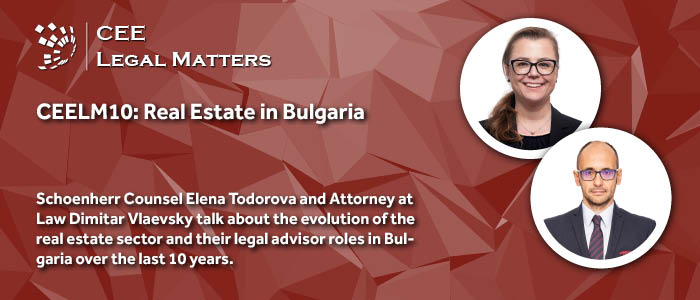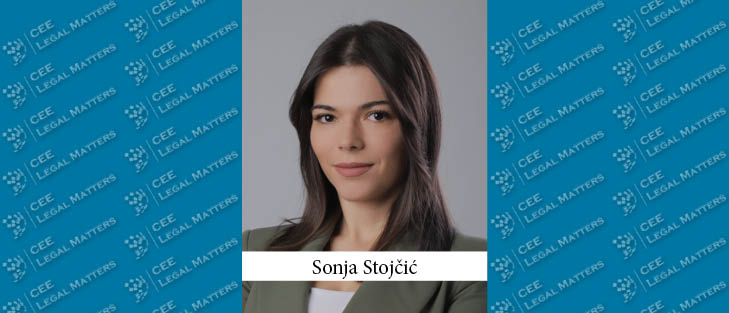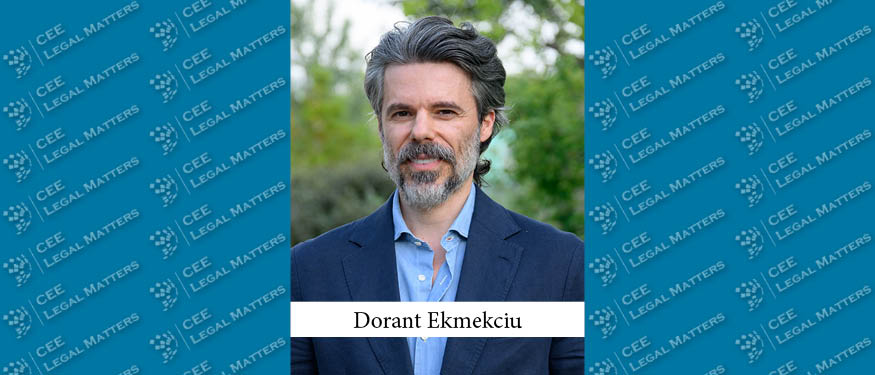Schoenherr Counsel Elena Todorova and Attorney at Law Dimitar Vlaevsky talk about the evolution of the real estate sector and their legal advisor roles in Bulgaria over the last 10 years.
CEELM: Over the last 10 years, what types of real estate projects have kept your team the busiest?
Todorova: A decade ago, the focus was on the real estate developments related to the rapid growth of renewables, particularly in 2012-2013, and that trend continues. The projects are becoming increasingly diverse, transitioning from predominantly greenfield initiatives in 2012 to a mix of greenfield and brownfield projects today. Over the last decade, we have closely monitored the development of renewable projects, aligning with the objectives of the EU Green Deal and following the general flow of the EU market.
Vlaevsky: Our typical workload has also involved working for clients engaged in the development or operation of large commercial centers, office spaces, industrial buildings, etc.
CEELM: What have been your most intense periods, and what factors do you believe led to them?
Todorova: There was an intense period between 2012 and 2013, and we are currently experiencing a similar peak. In the past, it was due to the government’s policy to maintain prices for green energy at specific levels. Now, we observe a parallel situation influenced by political factors, aligning with EU-wide policies such as the Green Deal, and industrial decarbonization. We anticipate that political considerations will continue to impact the Bulgarian market. Assessing the level of ESG compliance in Bulgaria, we expect significant construction and changes in ownership driven by positive actions or the failure to adapt.
Vlaevsky: Traditional real estate was the busiest just before the COVID-19 pandemic, with projects completed shortly before the outbreak. Nowadays, while the circumstances have changed, shopping centers are operational again. In contrast, the office market remains fragmented, mainly driven by local developers. Our focus has been on international clients, particularly in the IT sector. Before the pandemic, they were actively seeking premium office spaces due to the competitiveness of the IT labor market. However, the landscape shifted with the onset of the pandemic, and now there’s a widespread preference for remote work. Despite these changes, the market remains dynamic with numerous new projects in progress. Post-pandemic, there’s a fresh influx of projects in the pipeline.
CEELM: How have the profiles of real estate clients evolved over the last decade in Bulgaria?
Vlaevsky: A decade ago, clients primarily comprised retailers and developers. Subsequently, there was a noticeable shift toward clients from the energy, TMT, and IT sectors. The landscape of big business has evolved, and our client profile has transformed accordingly.CEELM: In terms of client needs, what new expectations do you see emerging in the real estate sector?
Todorova: Expectations have changed regarding what clients are seeking. In the past, when the clients wanted a new office, the emphasis was on a top location with good public transport connectivity. Presently, the priority is a certified building. If there’s no opportunity to choose from a selection of certified buildings, it could potentially jeopardize the entire project. Banks are influencing the pace and urging local developers to shift their mindset to align with these expectations. Additionally, in the past, our role as advisors was limited to offering pure legal services, i.e., interpreting what is written in the law and how it is implemented. Now, our advisory services have expanded, and we are frequently called upon to provide insights on the business side of things. Clients often seek predictions as to how a project will develop, requiring an extended form of advice. This shift is largely a result of the evolving legal system and the increasing digitization of the law.
CEELM: What have been the main recurring challenges faced in facilitating real estate deals and projects?
Vlaevsky: Working in Bulgaria is likely similar to all former communist countries in CEE – challenging because our legislation undergoes constant changes. There is no consistent and reliable legislative framework, and new types of business and transactions, such as energy, IT, and TMT, which were not prevalent in the legal market a decade ago, pose additional challenges. The difficulties extend to the Spatial Development Act, which has been amended three to four times a year for the past 15 years. This has led to ongoing disputes among lawyers, architects, judges, state authorities, and others. The current situation mirrors that of 10 or 15 years ago, with dynamic and sometimes poorly coordinated changes.
Todorova: In Bulgaria, there’s a common joke that the initial draft of the Spatial Development Act was designed so that you could only construct four-story residential buildings. Navigating through that when tasked with creating a power plant or infrastructure for a TMT operator is extremely challenging. It certainly adds an element of creativity and keeps the work engaging.
CEELM: What is on the horizon for the real estate sector for the next 10 years?
Todorova: Looking ahead, I would anticipate a more informal and digital real estate market in the next decade. A decade ago, without online registers, checking land development details was challenging. Now, it’s accessible via a simple app. Additionally, bureaucratic obstacles for permits seem to be easing. As for each segment of real estate, I wouldn’t invest in an office building now. Logistics might be worth considering in the next three to five years, but I’d lean toward residential properties due to their consistent demand, especially considering the lack of institutionalized investments in this sector.
Schoenherr is CEE Legal Matters' Practice Leader for Real Estate in Bulgaria for 2024 – learn more here.
This article was originally published in Issue 10.11 of the CEE Legal Matters Magazine. If you would like to receive a hard copy of the magazine, you can subscribe here.













